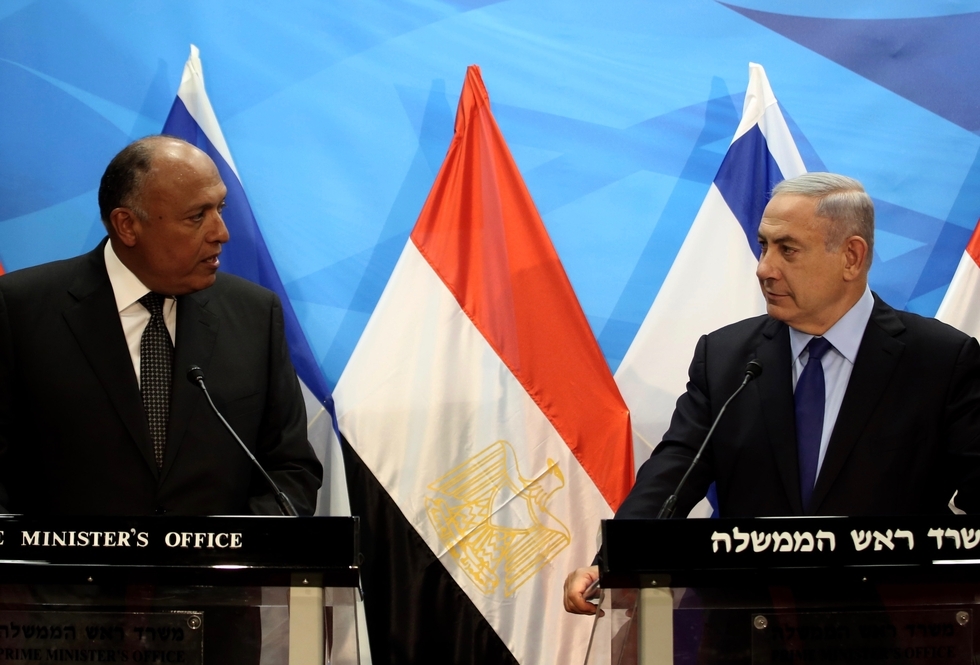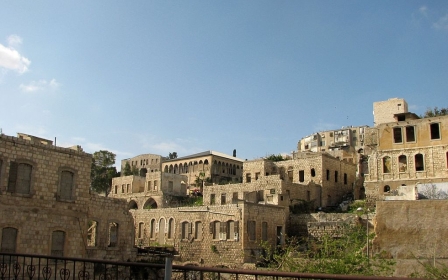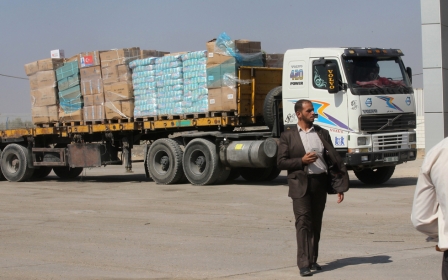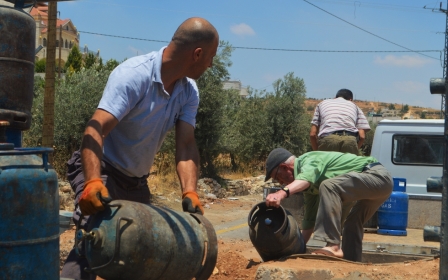Egypt, Israel meet in bid to revive Palestinian peace efforts

Egypt's foreign minister met Israeli Prime Minister Benjamin Netanyahu on Sunday in a diplomatic effort at reviving peace talks with the Palestinians, the first such visit in nearly a decade and the latest sign of warming ties.
The trip came amid talk of renewing an Arab peace initiative and with Israel's military having recently saluted "unprecedented" intelligence cooperation with Egypt to combat the Islamic State (IS) group.
Speaking to journalists alongside Netanyahu before their meeting, Foreign Minister Sameh Shoukry said: “My visit to Israel comes today at a crucial and challenging juncture for the Middle East.”
He said that the Palestinian-Israeli conflict has “raged on for more than half a century claiming thousands of victims, and crushing the hopes and aspirations of millions of Palestinians to establish their independent state based on the 1967 border, with East Jerusalem of its capital; as well as the aspirations of Israelis to live in peace in security and stability,” the Jerusalem Post reported.
Resolving the decades-old conflict would have a "far-reaching and dramatic and positive impact on the overall conditions of the Middle East region," he said.
"Egypt remains ready to contribute toward achieving this goal."
Shoukry also warned of the "constant deterioration" of the situation on the ground since the last round of Israeli-Palestinian peace talks collapsed in April 2014.
He said the current lack of process towards peace was "neither stable nor sustainable," and stressed the need for "serious steps to build confidence" toward the two-state vision.
Netanyahu welcomed Egyptian President Abdel Fattah al-Sisi's "recent offer of Egyptian leadership and efforts to advance peace with the Palestinians and a broader peace in our region".
He also called on Palestinians to engage in direct negotiations, as he has repeatedly done in the past.
'Real opportunity' for peace
An Israeli official said that during the meeting, Netanyahu asked for Egypt's help in returning the bodies of two Israeli soldiers held by Hamas in Gaza, as well as two Israeli civilians detained by the group in the Palestinian enclave.
Shoukry responded in the affirmative, the official said.
Netanyahu and Shoukry were to meet again later for talks over dinner at the premier's Jerusalem residence.
Palestinian leaders say years of talks with Israel have not ended the occupation, and have instead pursued international diplomacy to promote their cause.
On 29 June, Shoukry met Palestinian leaders during a visit to the West Bank city of Ramallah.
Sisi said in May there was a "real opportunity" for an Israeli-Palestinian deal that could lead to warmer ties between his country and Israel.
In 1979, Egypt was the first Arab state to sign a peace treaty with Israel after years of conflict, and it remains an influential player in the region.
However, ties have been formally cold over Israel's policies toward the Palestinians, and relations further soured after the June 2012 election of the Muslim Brotherhood's Mohamed Morsi as Egyptian president.
After president Hosni Mubarak's overthrow in the 2011 revolution, protesters stormed Israel's embassy in September that year amid clashes with police.
Morsi was ousted in July 2013 by then army chief Sisi, who was elected Egypt's president in 2014.
Morsi's government forged closer ties with Hamas-ruled Gaza and spoke out against Israel's siege of the enclave, but Sisi has reinforced the siege from Egypt's Rafah crossing and has destroyed many of the tunnels used to smuggle goods into Gaza.
In June, representatives from 28 Arab and Western countries, the Arab League, EU and the UN met in Paris to discuss a French-led initiative to advance peace efforts which Israel strongly opposes.
At the same time as opposing the French push, Netanyahu has spoken of reviving a long-dormant Arab peace initiative dating to 2002.
That proposal essentially calls for Israel to withdraw from the occupied territories and resolve the issue of refugees with the Palestinians, leading to the creation of a Palestinian state, in exchange for normalised relations with Arab countries.
'Existential threat'
But some analysts have questioned whether Netanyahu's comments were an attempt to fend off international critics over his appointment of hardline Defence Minister Avigdor Lieberman and his opposition to the French plan.
Netanyahu has said he would seek changes to the Arab proposal. The Arab League has said the terms cannot be changed.
There have been repeated warnings that Israeli settlement building and Palestinian attacks are eroding the possibility of a two-state solution, especially with peace efforts at a standstill since April 2014.
Violence since October has killed at least 214 Palestinians, 34 Israelis, two Americans, an Eritrean and a Sudanese.
Most of the Palestinians killed were carrying out knife, gun or car-ramming attacks, according to Israeli authorities.
Others were shot dead during protests and clashes, while some were killed by Israeli air strikes in the Gaza Strip.
Egypt and Israel have cooperated in other areas, particularly after militants in Egypt's Sinai Peninsula pledged allegiance in November 2014 to IS.
In April, Israel's deputy chief of staff spoke of an "unprecedented level of cooperation" with Egypt, mainly regarding intelligence.
Major General Yair Golan said "there is a strong feeling in the region... that we have to put aside past animosities and concentrate on mutual interests and working together" to deal with the militant threat.
However, he cautioned "that's between defence establishments, and I wouldn't describe that as some sort of reconciliation between the people.
"But it is a good starting point, and I'm quite optimistic concerning that."
New MEE newsletter: Jerusalem Dispatch
Sign up to get the latest insights and analysis on Israel-Palestine, alongside Turkey Unpacked and other MEE newsletters
Middle East Eye delivers independent and unrivalled coverage and analysis of the Middle East, North Africa and beyond. To learn more about republishing this content and the associated fees, please fill out this form. More about MEE can be found here.




